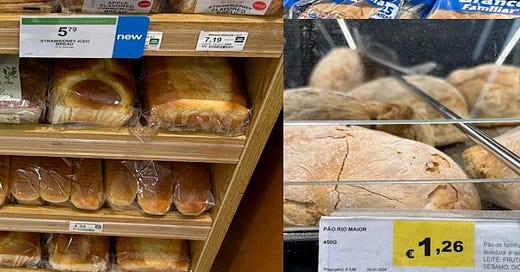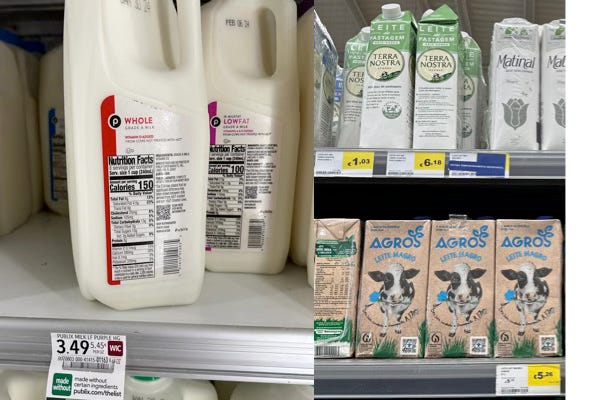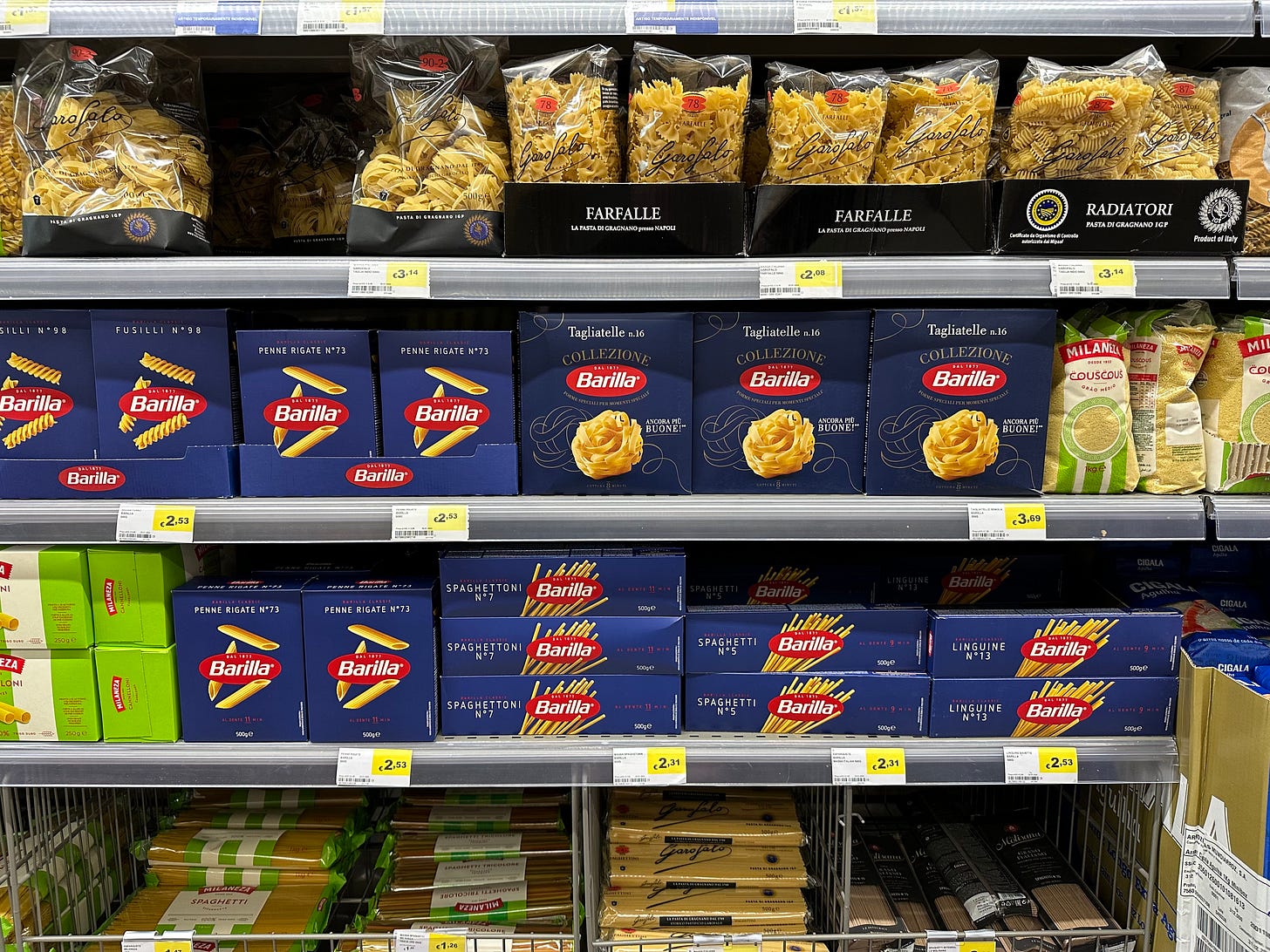I received an email about one week ago. It was short and sweet reading, “Can I afford to live in Portugal?” Given that limited information, I really don’t know. But I do know that you will have to eat. So let’s compare some grocery items.
Denise was in the U.S.
Many of our friends have mentioned how expensive food has become in the US. One friend sent me photos of $9 eggs and a $7 box of cereal from a trip to Boston. But, I know that prices can vary widely from store to store and state to state1. So while Denise was in Florida2 for a wedding and family visit, I asked her to do some research for me.
The photo you see on the left above is from her US visit…the one on the right is from my visit on Thursday to Continente (a large grocery chain store).3 We have five different grocery store chains in our small town: Aldi, Continente, Intermachen, Lidl, and PingaDoce. The locals will tell you that Aldi and Lidl are cheaper than Continente.
When comparing these prices, one must factor in the exchange rate. As I write this a US dollar is worth €0.92…so the fresh bread shown above costs $1.37.4
While you might pay $9 for a dozen eggs in some stores in the US, you can also find them for considerably less. The photo above compares “free range” eggs by the dozen. (Note European eggs are typically not refrigerated…the yokes are also more orange…and after boiling the shell separates from the eggs much more easily. I believe European eggs are also better tasting than those I purchased in the States. Then again, I was never buying eggs directly from a farmer.) If we do the conversion the eggs in Portugal cost $2.88.
Also, when comparing prices you must consider the different measurement systems used. One does not purchase a half-gallon or one-gallon jug of milk in Portugal. Instead, we buy individual cartons that hold 1 litre or a pack of six 1 litre cartons. (Note, again these are typically not refrigerated before opening.) 1.9 litres is roughly a half-gallon. So if we do all the math we see that the premium, grass-fed, milk from Azores costs approximately $2.13 per half a gallon.
If we compare the totals for these three non-vegan staples we find they are about 49% cheaper in Portugal.5 While strolling the aisles of Continente, I took note of a few other items my American readers will easily recognize for comparison:
Other Comparisons
Of course, there are many other costs to consider. While we have seen some recent pullback in the price of homes (5-6% in many Portuguese cities) we still have not seen this reflected in the rental market in VRSA. There are utilities: cell/internet is a lot less, electricity is a lot more. While the hourly rates for services are considerably less, one needs to remember to add the VAT which is 23%. And speaking of taxes…if you are coming from the States and missed NHR you must factor in Portuguese income tax.
So yes, there is a lot to consider when comparing the cost of living in another country. But permit me to suggest that you:
Plan for the worst case…take time to learn more about currency fluctuation. Look at forecasts, and historical highs and lows. Do you have a cushion that will allow you to “time the transfer of funds” or will you be experiencing these changes each month? (E.G. when a social security check is transferred to your Portuguese bank.)
Remember if the listed rent is relatively low you might have to walk up 4 flights, go without air conditioning or heat, do without appliances that seem standard in the US, etc.
Take your time and do a lot of research. Though not perfect the website Numbeo is a good place to start.
Finally, if you want more information don’t hesitate to email me with your questions or to set up a WhatsApp call. While my services may be worth exactly what I charge (nothing) I will always try to help.
Boa sorte, até à próxima vez
Nanc
All of the US prices shown are from Florida. When we moved to Florida from Pennsylvania many years ago it seemed to me that groceries were more expensive there. In doing research for this post, I learned that Florida ranks 5th among the most expensive states for groceries.
She was there from 18 -24 January 2024.
Please note, that I would never purchase the bread you see on the top right. I didn’t buy Wonder Bread in the US either.
When we first moved money to Portugal the US Dollar was worth only €0.84. Last year we enjoyed a couple of weeks of parity. You need to factor into your equation how fluctuating currency prices may impact you.
I don’t mean to minimize the impact global inflation has had on the Portuguese people. We spent about one hour recently talking to a middle-aged, college-educated couple who do not feel that their Portuguese wages are keeping pace with inflation. For 2024, the Portuguese minimum wage was increased about 5% to €820/month.











Nanc, As usual your research is comprehensive except for one glaring error. What no comparison for bottles of wine? I get that it is hard to compare a bottle of "Josh" to a bottle of "Adega de Borba", but I'll just lay out the facts. In Portugal I rarely pay more than 3 euros for a bottle of wine at the grocery store or 14 euros for a bottle at a restaurant. So IMHO, if you drink you can afford to live in Portugal.
:-)
I traveled to Portugal in September. In Lagos we grocery shopped a Lidl and Pingo Doce. I could not believe how inexpensive groceries and wine were. It was so significant I kept having to pick my jaw up off the Lidl floor. (I live in a Boston suburb). I love grocery shopping in Europe in general...it’s not overwhelming or massive and you can still find everything you need.